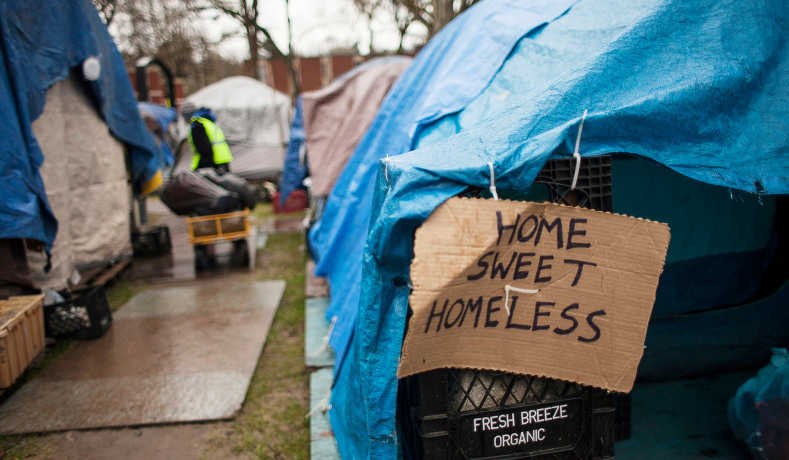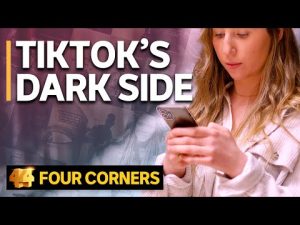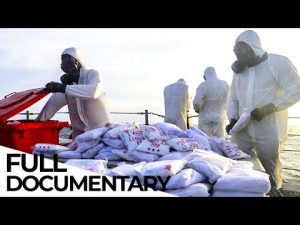Washington Highest Court Trying to Rewrite a Ministry Mission

A sign on a tent is seen at Tent City 3, a homeless encampment in Seattle, Washington January 15, 2015. Seattle Mayor Ed Murray will submit legislation to the City Council this week seeking approval of three new homeless encampments, saying the tent cities are needed to deal with rising homelessness, his office said on Thursday. REUTERS/David Ryder (UNITED STATES - Tags: SOCIETY POVERTY POLITICS) - GM1EB1G0K1Z01
Washington Highest Court Trying to Rewrite a Ministry Mission. Seattle’s Union Gospel Mission has been enormously successful in ministering to the city’s homeless population. Two years after program completion, 70 percent of Mission clients are working or going to school full time. Yet the Mission’s employees will freely say that success is just a byproduct of their most important priority: bringing others into relationship with Jesus Christ. It is that focus which makes the Mission so spectacularly successful.
Unlike other, similar groups, the Mission workers’ goal is not simply to provide for their homeless brothers and sisters. Its primary purpose is to bring the love of Jesus Christ and hope for a new life to those who most need it. The Mission seeks nothing less than to see every homeless neighbor loved, redeemed, and restored by meeting urgent physical needs while building relationships and offering faith. And that goal has resulted in the Mission helping cut down the amount of homelessness in the city of Seattle.
“All we do is share the Gospel,” said CEO Scott Chin. That’s not just professional modesty. It’s been the primary objective written into the Mission’s articles of incorporation since its founding nearly nine decades ago. Everything on the staff’s agenda takes second place to sharing Christ because of the Mission’s belief that only a changed heart will prompt a changed life.
It’s a key element of the Mission’s success that its staff members don’t wait for the homeless to come to the shelter. They go out looking for them. Mission teams venture into the more formidable areas of the city, where staff reach out to engage with those huddling around graffitied park tables and tenting under rumbling overpasses.
They offer kindness, a listening ear, and friendly support. They ask, “What do you need?” and try to provide what physical resources they can. And they do all of this as they promote spiritual healing.
It works. Mission workers serve over 1,000 of their homeless neighbors each day. And, again, of the many hurting people who take part in the Mission’s programs each year, about 70 percent are on the right track and either working or in school. It would be difficult to find another organization making such a positive impact in such a difficult area. And in a city where nearly 12,000 homeless individuals crowd the streets every night, that kind of success is vital not only to the lives of those on the streets, but to the well-being of the city itself.
Of course, a philosophy only works if everyone involved buys into it, which is why the Mission requires all full-time employees to share and live out their Christian religious beliefs, be actively involved in a local church, and be willing and able to share the Gospel with those whom they serve.
In 2016, though, a former volunteer decided to apply for a full-time position with the Mission’s legal-aid clinic — despite the fact that he did not agree with the Mission’s religious beliefs or follow its religious-lifestyle requirements. In fact, he wanted to change the Mission’s beliefs and dismiss the very faith that has spurred its remarkable success.
Understandably, the Mission turned down his application. The applicant opted to take the Mission to court, hoping to find a judge who would punish the organization for declining to hire him. He struck gold at the Washington Supreme Court, where all nine justices ruled in his favor, despite the legislature’s exclusion of religious nonprofits from state employment law.
In doing so, the state’s highest court effectively torpedoed a religious freedom that the federal government and nearly every other state protects: the ability of religious organizations to hire those who share and live out the organization’s beliefs. This ruling puts the Mission to an untenable choice: hire someone who has stated his intent to change the organization’s beliefs or shut its doors to the homeless neighbors who rely on the Mission for help.
This ruling is unconstitutional. Which is why the Mission has petitioned the U.S. Supreme Court to hear their case. The Mission — like the thousands of vulnerable individuals that it serves — depends on the nation’s highest court upholding the right of religious organizations to build and sustain organizations of believers who share the same faith.
John Bursch is senior counsel and vice president of appellate advocacy with Alliance Defending Freedom (@Alliance Defends) and represents Seattle’s Union Gospel Mission.








